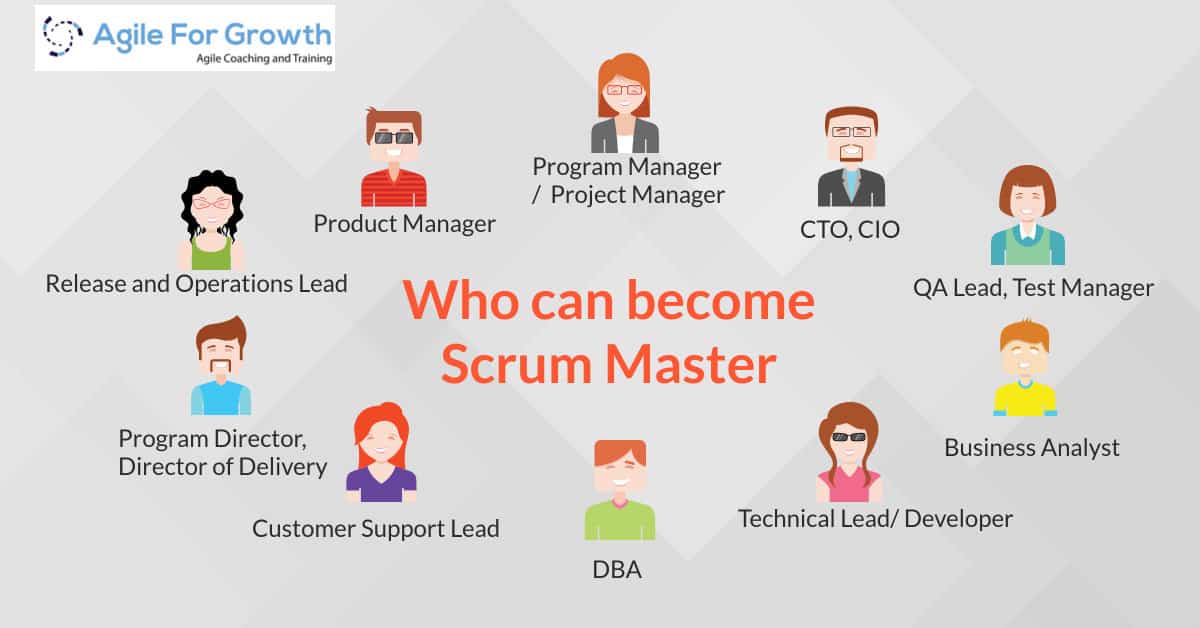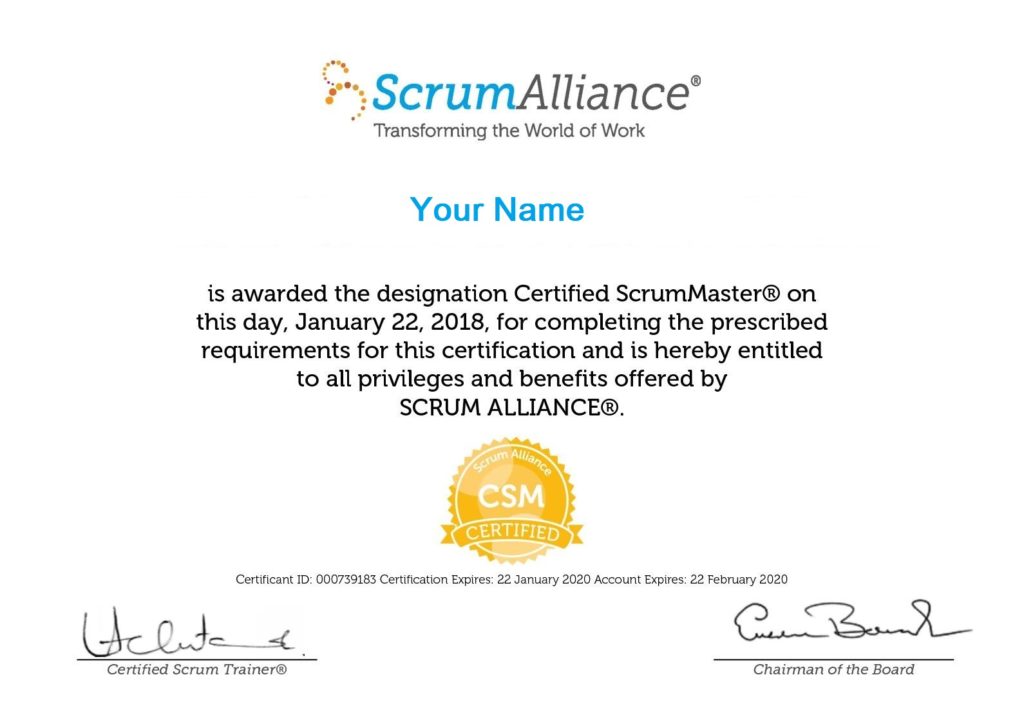What does a Scrum Master do?
A Scrum Master is a key role in Agile development teams, responsible for facilitating the Scrum framework and ensuring the team’s adherence to its principles. They help the team manage and prioritize tasks, remove obstacles, and maintain a productive workflow. By understanding the Scrum Master’s role and responsibilities, aspiring professionals can better appreciate the value of Scrum Master certification requirements and how they contribute to a Scrum team’s success.
Why get Scrum Master certified?
Scrum Master certification can significantly enhance one’s career prospects and professional skills in project management. By obtaining this credential, individuals demonstrate their commitment to Agile principles and their ability to lead Scrum teams effectively. Some key benefits of Scrum Master certification include:
- Increased job opportunities: As Agile methodologies continue to gain popularity, companies increasingly seek certified Scrum Masters to manage their projects. Scrum Master certification can open doors to new job opportunities and career advancements.
- Higher salary potential: Scrum Master certification can lead to higher earning potential due to the increased demand for certified professionals. According to industry reports, certified Scrum Masters often earn higher salaries than their non-certified counterparts.
- Improved project management skills: Scrum Master certification programs provide in-depth knowledge of Agile practices, helping candidates refine their project management skills and better understand the Scrum framework. This expertise can lead to more successful project outcomes and increased team productivity.
- Growing demand in various industries: Scrum Masters are needed in various sectors, including software development, manufacturing, finance, and healthcare. As businesses continue to adopt Agile methodologies, the demand for certified Scrum Masters will only increase.
Prerequisites for Scrum Master certification
Scrum Master certification programs typically have prerequisites designed to ensure candidates have a solid understanding of Agile methodologies and the necessary skills to succeed in the role. These prerequisites often include:
- Prior knowledge of Agile methodologies: A basic understanding of Agile principles and practices is essential for Scrum Master certification. Candidates should be familiar with Agile values, principles, and ceremonies, as well as the differences between Agile and traditional project management approaches.
- Work experience: Most certification programs require applicants to have a certain amount of work experience in a related field. This experience may include project management, software development, or other relevant roles where Agile methodologies are applied.
- Recommended training courses: Many certification programs recommend or require completion of specific training courses. These courses cover Scrum Master roles, responsibilities, and practices in-depth and help candidates prepare for certification exams.
These prerequisites ensure that candidates have the necessary foundation to benefit from Scrum Master certification programs and apply their knowledge in real-world situations. By meeting these requirements, aspiring Scrum Masters demonstrate their commitment to mastering Agile practices and their readiness to lead Scrum teams effectively.
Educational background and work experience
Successful Scrum Masters typically possess a solid educational background and relevant work experience. Here are some examples of degrees, certifications, and job titles often held by Scrum Masters:
- Educational background: Many Scrum Masters hold degrees in fields such as computer science, information technology, or business administration. A bachelor’s or master’s degree in these areas can provide a strong foundation in the principles and practices necessary for effective Scrum Mastery.
- Certifications: In addition to Scrum Master certification, candidates may also hold other Agile-related certifications, such as Certified Scrum Product Owner (CSPO) or Certified Scrum Developer (CSD). These certifications demonstrate a commitment to Agile principles and a deeper understanding of Scrum roles and processes.
- Job titles: Relevant job titles for Scrum Masters may include Project Manager, Team Lead, Software Developer, or Business Analyst. These roles often involve managing projects, coordinating teams, and applying Agile methodologies, providing a solid foundation for Scrum Master responsibilities.
Diverse experiences can be valuable in Scrum Master roles, as they allow individuals to approach challenges from different perspectives and better understand the needs of various team members. Pursuing a Scrum Master certification with a solid educational background and relevant work experience can significantly enhance one’s ability to contribute to a Scrum team’s success.
Scrum Master training and preparation
Aspiring Scrum Masters can choose from various training options to prepare for certification exams and maintain their credentials over time. Some popular training methods include:
- Online courses: Online Scrum Master certification courses offer flexibility and convenience, allowing candidates to learn at their own pace. These courses often include interactive modules, video tutorials, and practice exams to help candidates master Scrum concepts and prepare for certification exams.
- In-person workshops: In-person Scrum Master training workshops provide a more traditional classroom experience, with hands-on learning and direct interaction with instructors and peers. These workshops may be particularly beneficial for those who prefer face-to-face instruction and networking opportunities.
- Self-study materials: Self-study materials, such as textbooks, study guides, and practice exams, can help candidates prepare for Scrum Master certification exams independently. These resources are often available for purchase through certification organizations or third-party providers.
To prepare for certification exams, candidates should familiarize themselves with Scrum Master certification requirements, such as the Scrum Guide, and focus on understanding key Scrum concepts, roles, and practices. Developing a study plan, setting aside dedicated study time, and taking practice exams can also help candidates feel more confident and prepared on exam day.
Maintaining Scrum Master certification often involves completing continuing education credits or participating in ongoing professional development activities. Staying current with industry trends, attending Scrum Master conferences, and joining Scrum Master communities can help Scrum Masters expand their skills and knowledge, ensuring they remain valuable contributors to their organizations and the Agile community.
Selecting a Scrum Master certification program
Choosing the right Scrum Master certification program is crucial for ensuring a successful certification process and long-term career growth. When evaluating different Scrum Master certification programs, consider the following factors:
- Cost: Scrum Master certification programs can vary significantly in price. Determine your budget and consider the value provided by each program before making a decision.
- Recognition: Some certification programs are more widely recognized than others. Research the reputation of each program and consider how it may impact your career prospects.
- Renewal requirements: Some certifications require periodic renewals, often involving additional costs and continuing education credits. Be aware of these requirements and factor them into your decision-making process.
Popular Scrum Master certification programs include:
- Scrum Alliance Certified ScrumMaster (CSM): The CSM is a widely recognized Scrum Master certification offered by the Scrum Alliance. It requires completion of an in-person or online training course and passing a certification exam.
- Scrum.org Professional Scrum Master (PSM): The PSM is another well-regarded Scrum Master certification offered by Scrum.org. It is available at three levels (PSM I, PSM II, and PSM III) and can be obtained by passing a certification exam after self-study or attending a training course.
When selecting a Scrum Master certification program, consider your individual needs, goals, and learning style. Research each program thoroughly, and don’t hesitate to reach out to alumni or instructors for additional insights and guidance.
Maintaining and expanding Scrum Master skills
Continuous learning and skill development are essential for Scrum Masters to stay current in their field and deliver maximum value to their organizations. Here are some opportunities for professional growth:
- Attend industry conferences: Industry conferences provide excellent opportunities to learn about the latest trends, best practices, and tools in Agile and Scrum. They also offer networking opportunities with other Scrum Masters, Agile practitioners, and industry leaders.
- Join Scrum Master communities: Participating in Scrum Master communities, such as online forums, social media groups, or local meetups, allows Scrum Masters to engage in discussions, ask questions, and share experiences with their peers. These communities can serve as valuable sources of support, inspiration, and learning.
- Pursue advanced certifications: Advanced certifications, such as Certified Scrum Professional (CSP), demonstrate a Scrum Master’s commitment to mastering their craft and staying up-to-date on the latest Scrum practices. These certifications often involve rigorous coursework, hands-on experience, and the completion of challenging exams.
By actively maintaining and expanding their skills, Scrum Masters can enhance their career prospects, increase their value to their organizations, and contribute more effectively to the success of Scrum teams. Staying engaged in the Agile and Scrum communities and continuously learning can help Scrum Masters overcome challenges, adapt to changing circumstances, and drive innovation in their field.
Overcoming challenges in Scrum Master certification
Pursuing Scrum Master certification can be a rewarding experience, but it may also present several challenges. Here are some common obstacles and strategies for overcoming them:
- Time constraints: Balancing work, personal life, and certification preparation can be difficult. To manage time effectively, create a study schedule, break study sessions into manageable chunks, and make use of any available downtime, such as commuting or waiting in line.
- Financial limitations: Scrum Master certification programs and training courses can be expensive. To minimize costs, explore affordable online courses, take advantage of promotional offers or discounts, and consider self-study materials or group study sessions.
- Lack of experience: If you’re new to Agile methodologies or Scrum, gaining practical experience can be challenging. Consider volunteering for Scrum projects at work, participating in open-source projects, or joining local Agile or Scrum groups to gain hands-on experience.
By proactively addressing these challenges and staying focused on your goals, you can increase your chances of Scrum Master certification success. Remember that the journey to certification is an opportunity for growth, learning, and networking, and the rewards can be significant in terms of career advancement, increased earning potential, and improved project management skills.






